There's one word that resonates when somebody refers to franchise opportunities: ubiquitous. Wherever you look, you'll find one. Maybe you're in one right now, enjoying a latte or a burger, buying supplies, sending a package, or even learning something new.
Even the U.S.
Economic Census shows data that franchising is key to many industries and our economy. And whether we are conscious of it or not, these types of businesses do play a significant role in our lives.
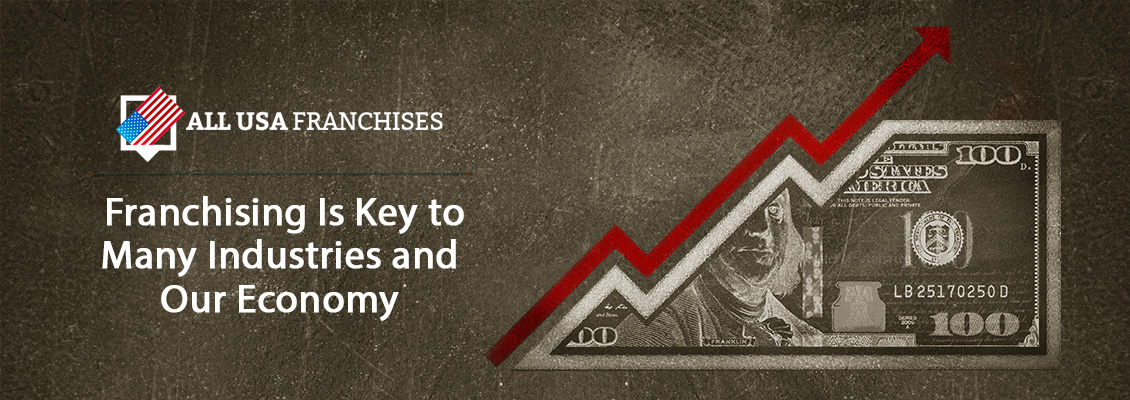
Here are some quick facts the Census found. Around 63% of private mailing centers are franchises and so are 53% of diet and weight loss centers. Franchisees operate 100% of all new car dealerships, and 93% of retail optical shops are operated by franchisors.
Even though the boom of the franchise system didn't take place until after World War II, its concept has a very long history. And, in its current form, it's the ultimate American business invention.
However, this business model is not only popular in the U.S. It has become the go-to option for many expanding businesses around the globe, given the many perks it offers entrepreneurs and franchisors.
Some of the
benefits of franchising are tested products and services, a well-established business model, brand recognition, and other perks mentioned in our blogs.
But how did franchising become the system that many business owners use to expand their businesses, which numerous entrepreneurs turn to for great business opportunities? Well, it all started a very long time ago.
From the Middle Ages to Colonial Times: Early Franchising Opportunities
The Middle Ages were tough times. There were famines, plagues, and unsanitary living conditions. Life was hard unless you were a landowner or part of the nobility.
The concept of franchising sort of appeared during this era. Landowners granted some people of high stature licenses to maintain order, assess taxes, or develop commercial ventures in exchange for a percentage of the profits.
This was expanded during colonial times as European monarchies started granting licenses to individuals to establish colonies. Those colonies would then divide the land among the farmers and pay taxes (royalties) back to the crown.
Even though these systems weren't exactly the same as today's franchise model, they planted the seeds of modern franchising in America. It wasn't until the 18th and 19th centuries that the franchise model began to evolve and look familiar to today.
The 1730s: Benjamin Franklin's Printing Business
Many agree that
the history of modern franchising in the U.S. began in Philadelphia in 1731 when Benjamin Franklin entered into a business agreement with Thomas Whitmarsh to expand his printing business to Charlestown in South Carolina.
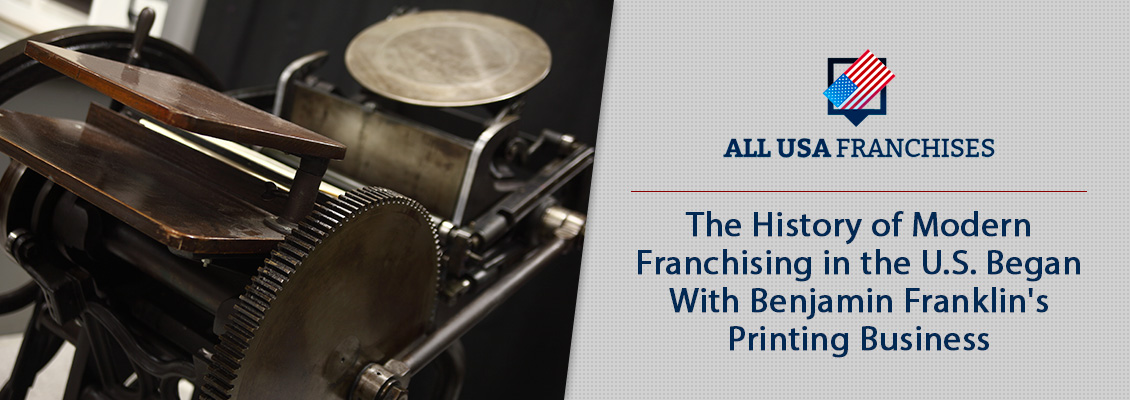
Their business agreement was far from similar to our modern-day franchise systems. Still, it did have many of the elements we recognize in today's franchises.
For example, there were non-compete clauses, and Whitmarsh had to purchase all of the equipment and paper from Franklin. This mirrors how franchisees get their equipment and products that they'd use and sell from their franchisors today.
Also, like in modern franchises where the franchisee is responsible for running their location, Whitmarsh was required to manage the business himself and was responsible for its expenses.
Franklin went on to establish five more locations across the U.S. with similar business agreements. He even expanded outside the U.S., establishing printing shops following the same system in Dominica, Jamaica, Canada, and Great Britain.
The seed of the modern franchise system had been planted, and our next set of entrepreneurs helped it grow.
The 1880s: Singer and His Sewing Machines
Just before the turn of the 20th century, Isaac Singer had a revolutionary product. At that time, the textile industry depended on industrial sewing machines and manual labor. However, he had invented a sewing machine that was not only compact, but it could also do 900 stitches per minute.
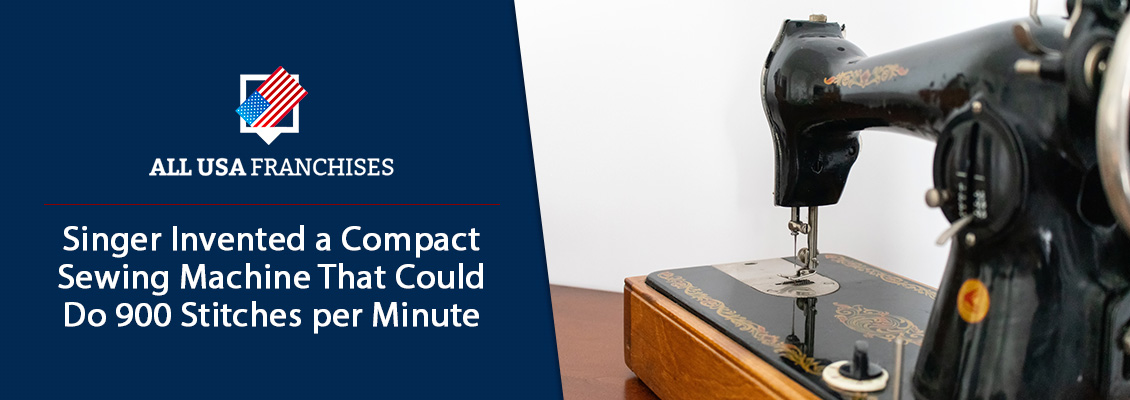
So what was the problem? His sewing machines were outrageously expensive. Very few people and businesses could afford them.
This would have spelled a dead-end for some, but not for Singer.
He was determined to sell his machines, and one day, his partner came up with an idea to do just that: a pay-in-installments plan. Singer used the plan to get customers interested in his product. But that wasn't enough. He wanted to sell a ton of sewing machines.
So what did he do?
He entered into licensing agreements with businessmen who were interested in selling his machines. This meant that businessmen could purchase the exclusive rights to sell Singer's sewing machines in specific territories, which allowed Singer to reach a broader market at a fraction of the cost.
Yet, it wasn't until our next character came into play that the franchise system was starting to look more like it is today.
1891 and the Harper Method Shops
In 1891, an ingenious lady named Martha Matilda Harper ran a very successful hairdressing salon in Rochester, New York. She developed her own method of hair and skincare and coined it the "Harper Method."
Harper expanded her business by offering women a comprehensive training course in her salon, and she established another training school in 1926. Women who graduated from her courses were assigned a territory to open up their own Harper Hairdressing Parlor.
In the
history of franchising, Harper played an important role because hers was the first franchise system with almost all the elements of modern franchises. Offering initial and continual training, branded products, advertising, and group insurance, by 1928, there were over 500 Harper Shops across the world.
The Industrial Revolution and General Motors
The industrial revolution and the invention of the assembly line and the automobile were game-changers. Now that the costs of assembling cars were much lower, this allowed manufacturers to offer their vehicles at a much lower price. This resulted in a boom in consumer demand across the U.S.
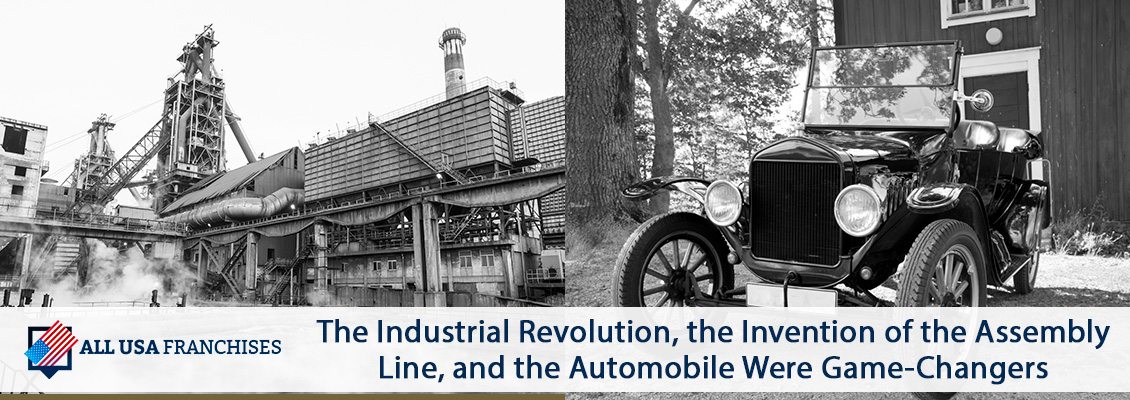
Yet, the problem was finding a way to distribute their cars efficiently and cost-effectively across the U.S. At the time, they didn't have the kind of capital required to open a chain of stores themselves.
So, the executives at G.M. solved their distribution problems by selling their first franchise to William Metzger of Detroit in 1898.
Through franchising, G.M. was able to reach a broader market. Still, the success of the franchise business model didn't stop with the automotive industry.
Coca-Cola Takes Off
Coca-Cola isn't one giant corporation; it's a system of almost 275 companies that are connected to one company. Yet, way back in 1899, Coca-Cola was facing similar challenges to those of G.M. They needed to distribute their product across the U.S., but transporting the finished product in glass bottles was too expensive.
That year, Benjamin F. Thomas and Joseph B. Whitehead asked Coke's chairman Asa Griggs Candler for the rights to bottle Coke.
At the time, Coke was sold as a syrup that retailers would mix with soda water to create the now-famous drink.
Candler wanted to distribute his product without giving the rights to the syrup, so he gave the rights to bottle Coca-Cola to Thomas and Whitehead for just a dollar.
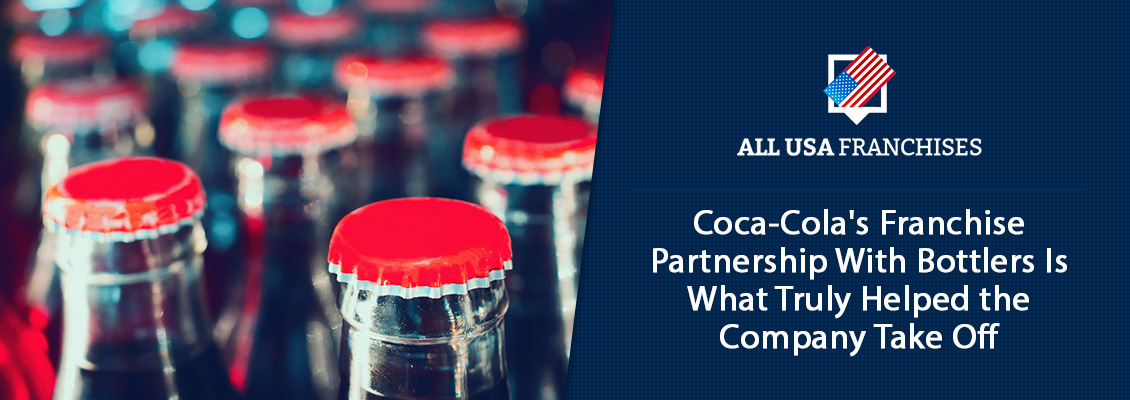
This franchise partnership with bottlers is what truly helped the company take off. Yet, the beverage industry wasn't the only one taking advantage of the franchise system. Let's fast-forward to the 20th century to the most iconic franchise to date.
The 1960s and the Golden Arches
Richard and Maurice McDonald founded the famous fast-food joint McDonald's in 1940. They named their efficient burger cooking process the "Speedee Service System." In 1955, Ray Kroc had heard of these two brothers who had the art of making a fast hamburger down to a science.
He drove out to California to see it. Once he did, Kroc was convinced that their model could be reproduced in restaurants all over the world. This was the beginning of the largest fast-food empire expansion in the world.
Ray Kroc wasted no time convincing the brothers to trademark their company and let him become their "franchise agent" to sell the restaurant's image and operational methods to a handful of entrepreneurs. By 1959, McDonald's had 102 locations.
Today, McDonald's is a world-spanning fast-food empire with over 38,000 locations in over 100 countries, according to their
franchising overview. It is also one of the most profitable franchises to own.
Why Has Franchising Stayed So Popular?
The simple answer is that it's a win-win for business owners who want to expand and entrepreneurs looking for a good investment.
Franchising can help a business grow quickly and expand into territories that it may not be able to reach otherwise without the help of franchisees.
Selling the right to use a trademark may give companies extra capital and diminish the financial risks of opening new locations. The franchisees will be the ones to assume these risks because they will be responsible for running the location and turning a profit.
Franchising is also beneficial for entrepreneurs. It's easier to market a recognizable brand than it is to start from scratch. Also, you're not only buying the rights to use the name of a franchise but also its business model.
Furthermore, buying a franchise often gives entrepreneurs access to high-quality training that can make them feel more secure managing their business.
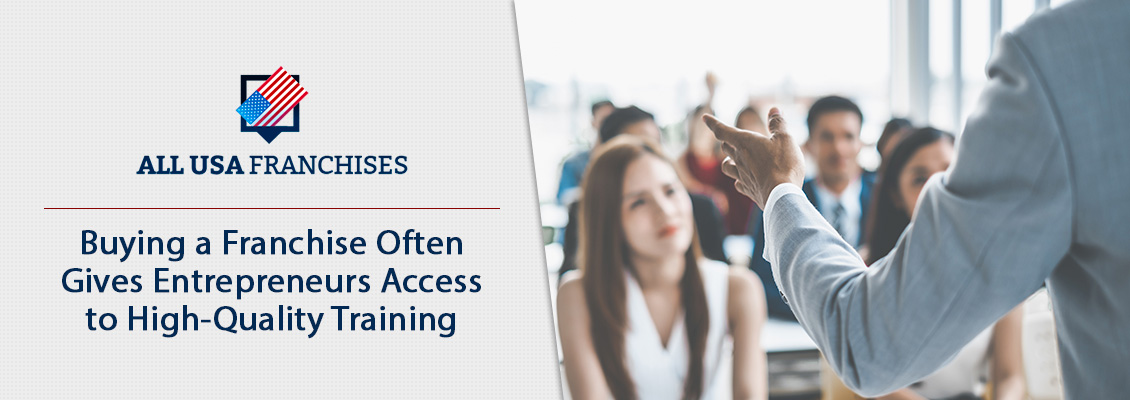
At the end of the day, the best thing about being a franchisee is that it's still your business. You can make it grow as much as you want with the support of the franchisor.
Where Can I Find More Franchise Opportunities?
If you are sold on the idea of franchising and wish there was a single resource where you could find detailed information on all the available franchise opportunities in the USA, then All USA Franchises is what you have been looking for.
All USA Franchises is a franchise portal and directory that provides an overview of each franchise's initial investment requirements, opportunity benefits, videos, and more. We are on a mission to list all of the 3,000+ franchise systems in the U.S.
This means you can find all types of business opportunities, from
Automotive Franchises,
Entertainment Franchises,
Construction Franchises,
Beauty Franchises,
Food Franchises,
Pet Services Franchises,
Retail Franchises, and so much more.
Start your franchise search to find that franchise opportunity that's just the right fit for you.
Also, If you are a franchisor, All USA Franchises provides greater exposure for your franchise, and it's completely FREE.
List your franchise now to be found by many potential franchisees.
But that's not all. If you're looking for franchise resources, we provide you with an informative AUF
blog that's full of helpful articles and tips for current and potential franchisees, franchisors, investors, and entrepreneurs.
You'll also find the latest franchise news and information about the
franchise events you won't want to miss.
We also help you locate
franchise advisors,
franchise brokers,
franchise consultants,
franchise financing,
franchise developers,
franchise lawyers, and
franchise training services. These resources will save you time and can provide you with additional franchise help when you need it.
If you found this article helpful then let us know in the comments section below. Likewise, feel free to share it using the share options below. Want us to cover another topic of your interest pertaining to Franchising? If so, then like us and follow us on social media, and post to any of our social media profiles the topic you'd like us to discuss:
Facebook All USA Franchises,
Twitter @AllUSAFranchise, and
Instagram @allusafranchises





